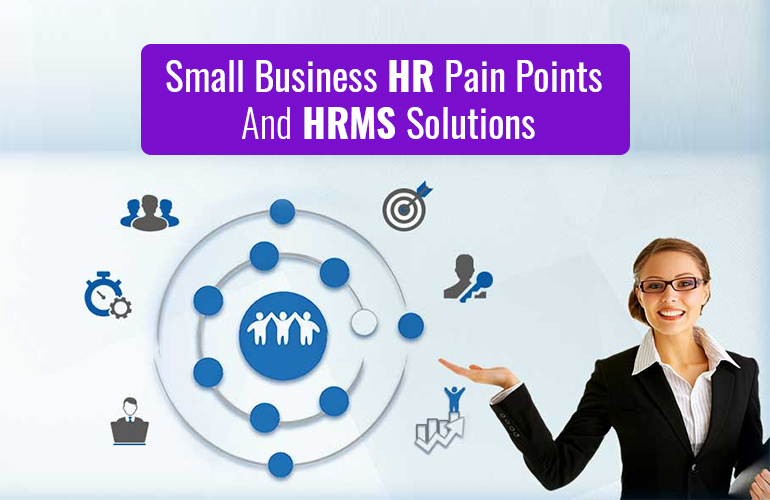In the ever-evolving landscape of modern business, small enterprises face unique challenges when it comes to HR management. Handling HR tasks efficiently can be a struggle, often leading to critical HR pain points hindering business growth. However, with the advent of Human Resource Management Systems (HRMS), small businesses now have a powerful tool to address these issues head-on. In this guest post, we’ll explore small businesses’ common HR challenges and discuss how HRMS serves as a robust solution to alleviate these pain points.
HR Pain Points In Small Businesses
Here are some of the struggles that HR managers face on a daily basis, taking much of their time in resolving these issues.
Inefficient HR Processes
Small businesses frequently rely on manual HR processes, such as employee data management, leave requests and attendance tracking. These processes are time-consuming, error-prone, and can overwhelm HR staff.
HRMS Solution: HRMS streamlines HR tasks through automation. It simplifies data management, automates leave approvals, and enables accurate attendance tracking. This saves time and reduces errors, allowing HR teams to focus on strategic HR initiatives.
Compliance Concerns
Small businesses often struggle with HR compliance, as they must adhere to various labour laws, tax regulations, and reporting requirements. Non-compliance can lead to legal issues and financial penalties.
HRMS Solution: HRMS solutions are designed to stay up-to-date with ever-changing labour laws and regulations. They automate compliance management, ensuring accurate tax calculations, timely filings, and straightforward reporting. This feature reduces the risk of non-compliance and associated penalties.
Limited Employee Self-Service
Employees in small businesses may have limited access to their HR information, making it challenging to check pay stubs, request time off, or update personal information.
HRMS Solution: HRMS platforms offer self-service portals for employees. These portals allow them to access their payroll details, submit leave requests, and update their personal information. Providing this autonomy enhances the employee experience and reduces HR’s administrative workload.
Data Inaccuracy
Manual data entry often leads to errors, resulting in payroll discrepancies, compliance issues, and employee dissatisfaction.
HRMS Solution: HRMS minimizes data inaccuracies by centralizing HR data and automating data entry. This ensures data consistency, leading to precise payroll calculations and compliance management.
Scalability Challenges
Small businesses may struggle to accommodate growth and increase HR tasks and responsibilities. Traditional HR processes can become overwhelmed.
HRMS Solution: HRMS platforms are scalable quickly adapting to the growing needs of small businesses. They efficiently handle increased HR workloads without compromising accuracy or efficiency.
Limited Reporting and Analytics
Small businesses often lack the resources for advanced HR reporting and analytics, which hinders data-driven decision-making.
HRMS Solution: HRMS systems offer robust reporting and analytics tools, providing valuable insights into HR data. Small businesses can utilize these features to make informed decisions and enhance their HR strategies.
When to Consider HRMS
The challenges mentioned above are telltale signs that a small business should consider implementing HRMS. Investing in HR software can lead to streamlined processes, enhanced compliance, improved employee experiences, and scalable HR operations. Small companies harnessing HRMS’s power can effectively address their HR pain points and position themselves for sustainable growth.
Maximizing the Benefits
Once you’ve identified your small business’s pain points and decided to implement an HRMS, it’s essential to maximise its benefits. Here are some critical steps to ensure you’re making the most of your HRMS:
- Training and Onboarding: Provide comprehensive training for your HR team and relevant staff. Familiarity with the HRMS is crucial for leveraging its features effectively.
- Customization: Tailor your HRMS to your small business’s unique needs. This may involve configuring workflows, setting up custom reports, or adjusting leave policies to align with your company culture.
- Data Management: Maintain data accuracy and consistency. Regularly update and review information to ensure the HRMS operates at its best.
- Regular Evaluation: Continuously assess the HRMS’s performance. Seek feedback from users to identify areas for improvement and implement updates accordingly.
By taking these steps, your small business can address HR pain points effectively and make the most of your HRMS investment.
Key Take Away
In conclusion, HRMS is the solution that small businesses need to navigate the complexities of HR management. By mitigating common HR pain points, HRMS empowers small enterprises to focus on their core operations and drive success. Don’t let HR issues hold your business back; embrace the benefits of HRMS to optimize your HR processes and elevate your small business to new heights.
Also Read: https://confluxhr.com/blog/affordable-hr-software-solutions-small-business/











